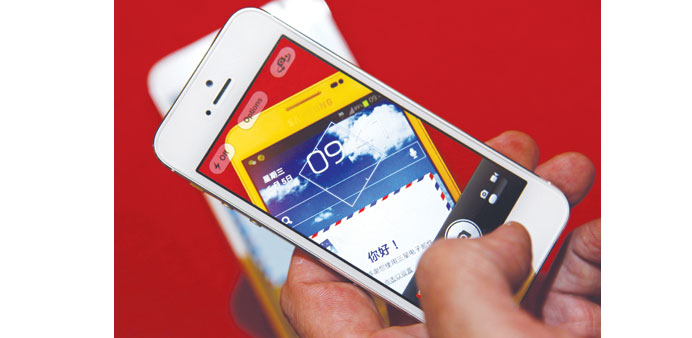A man uses an iPhone 5 to take a picture of a Samsung Galaxy Note smartphone in Beijing. The mobile industry has long held that Samsung’s broad range of mobile devices makes it nimble in changing markets, while Apple loses out by rigidly sticking to its high-end gadgets.
Reuters/Beijing
The mobile industry has long held that Samsung’s broad range of mobile devices makes it nimble in changing markets, while Apple loses out by rigidly sticking to its high-end gadgets.
But manufacturers’ recent earnings reports challenge those assumptions, at least in China, the world’s biggest mobile market – where the roll-out of the next-generation 4G wireless network has been touted as a booster for smartphone makers seeking growth as demand in advanced countries falters.
Apple Inc’s latest quarterly results showed sales of its high-end phones in China grew at nearly twice the pace analysts had expected. Meanwhile, budget offerings from Chinese firms won at the cheaper end, effectively squeezing industry leader Samsung Electronics Co.
Even as Apple posted strong China sales, the South Korean tech giant warned this month that quarterly earnings could drop 25% due to an inventory build-up of cheaper phones and weaker demand for 3G products in China.
That could suggest that Samsung’s strategy of offering everything to counter every price point may actually have left it stranded between being a price competitive brand and a premium gadget seller. By contrast, Apple has studiously cultivated its high-end aura, and its iPhones and iPads continue to command a higher price tag on average than its rivals. Samsung has strong brand loyalty in China, but charges 60-100% more than Chinese-made phones with similar features, said Tom Kang, an analyst at Counterpoint Research in Seoul. “Even though they have a brand premium, that’s a bit too much.”
Samsung declined to comment for this article. Samsung’s high-end smartphones and tablets such as its Galaxy S range, its answer to the iPhone and iPad, accounted for just a quarter of its January-March sales volume in China, while devices priced below 500 yuan ($80.75) made up the vast majority, according to data firm Canalys.
At the same time, Samsung has come under pressure from the rise of Chinese budget handset makers like Xiaomi, which this week released the Mi 4, its new 1,999 yuan 4G handset.
Underscoring the challenges Samsung faces, it had just one model in China’s top-5 best sellers in May and June – with its big-screen Galaxy Note 3 tied in fifth place with a Lenovo Group phone, according to Counterpoint. Apple said this week its third-quarter revenue was buoyed by unexpectedly strong results in China, where iPhone sales jumped nearly 50% in April-June.
“China, honestly, was surprising to us ... we thought it would be strong, but it went well past what we thought. The unit growth was really off the charts across the board,” CEO Tim Cook told analysts on Tuesday. China Mobile’s 4G customer growth has been accelerating after a tepid start in February. The number of 4G subscribers rose to nearly 14mn in June, up from just 1.3mn at the end of February.
“A lot of China Mobile customers have been holding on to old phones, so when the high-speed 4G came out they naturally switched to a 5S or 5C and upgraded. This trend will only become more apparent with the iPhone 6’s release,” said CK Lu, an analyst at Gartner.
China Mobile, the world’s biggest carrier by subscribers, declined to disclose the current breakdown of its 4G subscribers, but its chairman, Xi Guohua, said in March that “most of our 1.34mn 4G users are using an iPhone.”
For Samsung, the widely anticipated 4G roll-out has delivered a mixed result.
“The roll-out of 4G helped both Samsung and Apple initially, but the operator and regulatory body’s ... policies had recently been unfavorable towards Samsung as the 3G demand and subsidy dropped,” said Counterpoint’s Kang. “Samsung had been selling quite a lot of volume of 3G phones to Chinese operators but that demand dropped sharply. The recent pro-4G policies that penalised 3G vendors ... was not favourable to Samsung.”
Samsung said earlier this month its China sales were hurt by price competition in the low- to mid-tier sectors as well as tepid sales of 3G devices, as buyers wait to buy high-end 4G phones. As China Mobile expands services and smaller rivals China Unicom and China Telecom prepare to launch their preferred competing 4G technology, handset makers are bracing for more surprises – with new product plans including Apple’s widely expected bigger-screen iPhone.

